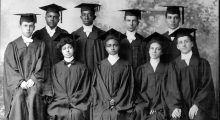Authors — Filmmaker Staff
-
“Editing Is an Unending Series of Difficult Decisions”: Editor Peter Kinoy on 500 YEARS

For director Pamela Yates and her colleagues at Skylight, 500 YEARS marks the end of a documentary trilogy on Guatemala. The film follows When the Mountains Tremble (1983) and Granito: How to Nail a Dictator (2011), both of which screened in previous years at the Sundance Film Festival. Veteran documentary editor Peter Kinoy edited all three films. Below, he discusses Skylight’s unique model as both a human rights organization and a film production company. Filmmaker: How and why did you wind up being the editor of your film? What were the factors and attributes that led to your being hired for this job? Kinoy: I […]
by Filmmaker Staff on Jan 25, 2017 -
“The Deep Angst and Disenfranchisement that Many People Feel”: Director Kyoko Miyake | Tokyo Idols


During its development, production or eventual distribution, what specific challenge of communication did, or will your film, face? How did you deal with it, or how are you planning to deal with it? Tokyo Idols explores a cultural phenomenon driven by an obsession with young female sexuality, and the growing disconnect between men and women in hyper-modern societies. The idol singers are predominantly teenage girls, and their fans are mostly middle aged men. At the beginning, I was reluctant to talk to the fans as I struggled to empathize with them. For me, they were “on the other side” not only […]
by Filmmaker Staff on Jan 25, 2017 -
“We Really Wanted to Do His Story Justice”: Director Matt Ruskin | Crown Heights


During its development, production or eventual distribution, what specific challenge of communication did, or will your film, face? How did you deal with it, or how are you planning to deal with it? I think the challenge with this film was how do you watch Colin Warner do 20 years in prison? How do you convey who this person is when he’s stripped of everything, and then how do you communicate the inner life he cultivated while in prison? I really respond to visual storytelling, so rather than plastering the film with voiceover we used a lot of imagery, whether it […]
by Filmmaker Staff on Jan 25, 2017 -
“The Story of Ferguson through the Eyes of the People Who Lived it”: Director Sabaah Folayan | Whose Streets


During its development, production or eventual distribution, what specific challenge of communication did, or will your film, face? How did you deal with it, or how are you planning to deal with it? By the time we wrapped our last shooting day, we had collected over 300 hours of footage. Lungs shouted for justice and moments later filled with tear gas. A father baked cookies during a moment of peace. A police chief and a mayor cited lack of data. Our creative team quickly realized we had several possible movies on our hands, but our goal was singular; we wanted […]
by Filmmaker Staff on Jan 24, 2017 -
“Communication Is Where a Film Lives and Dies”: Director Zoe Lister-Jones | Band Aid


During its development, production or eventual distribution, what specific challenge of communication did, or will your film, face? How did you deal with it, or how are you planning to deal with it? Communication is where a film lives and dies. It is essential for efficacy, for performance, and ultimately for translating a director’s vision to the screen. To me communication is less about the art of talking than it is about the art of listening. I hired an all-female crew on Band Aid, which was deliberate on many fronts, one of which was rooted in this very issue. At […]
by Filmmaker Staff on Jan 24, 2017 -
“The Horror of Modern Warfare”: Editor Joe Klotz on The Yellow Birds


French filmmaker Alexandre Moors made his feature debut in 2013 with Blue Caprice, an acclaimed indie inspired by the 2002 Washington, DC sniper attacks. He returns to Sundance (where Blue Caprice premiered) in 2017 with The Yellow Birds, an Iraq War drama screening in competition. Moors hired Joe Klotz to edit The Yellow Birds in part based on his affection for The Paperboy, one of three Lee Daniels films Klotz has edited. Below, Klotz discusses how he and Moors balanced “the fragmented nature of time” in the script with their mandate to tell a coherent narrative. The Yellow Birds will screen six times during the […]
by Filmmaker Staff on Jan 24, 2017 -
Writer/Directing/Editor José María Cabral on Sundance Prison Drama Woodpeckers


Dominican writer/director José María Cabral has made several feature films at the age of just 28. His latest, Woodpeckers (Carpinteros), tells a love story inside the Najayo Prison in the Dominican Republic. As he’s done on most of his features to date, Cabral served as the editor on Woodpeckers. Below, Cabral discusses the challenges of editing this film, which relies heavily on a form of prison sign language (or wood-pecking) for communication. Woodpeckers premiered in competition at the 2017 Sundance Film Festival. Filmmaker: How and why did you wind up being the editor of your film? What were the factors and attributes that led to […]
by Filmmaker Staff on Jan 24, 2017 -
“Profound Communication Only Happens When There Is Persistence”: Director Pamela Yates | 500 YEARS



During its development, production or eventual distribution, what specific challenge of communication did, or will your film, face? How did you deal with it, or how are you planning to deal with it? I often ask myself, how does each of us weave our own responsibilities into the pattern of history? How can I tell stories about human rights and the quest for justice yet engage people who are uninterested or apathetic? And the answer has always brought me back to this idea of the persistence of vision. Just as in cinema, believing that we will create a new art, […]
by Filmmaker Staff on Jan 24, 2017 -
“A Huge Historical Project”: Editor Kim Miille on Tell Them We Are Rising: The Story of Black Colleges and Universities


MacArthur Fellow Stanley Nelson has devoted his career to documentary explorations of the African American experience. The 65-year-old director/producer has made films on Marcus Garvey, the Freedom Riders and the Black Panthers. His most recent film is Tell Them We Are Rising: The Story of Black Colleges and Universities, which premiered this week at the 2017 Sundance Film Festival. Nelson hired editor Kim Miille to cut the film. Below, Miille shares her thoughts on historically black colleges and universities (HBCUs), making archival photos and letters cinematic and her origins as an editor. Filmmaker: How and why did you wind up being the […]
by Filmmaker Staff on Jan 24, 2017 -
“The Challenge Is Balancing Tone”: Director Mark Pellington | The Last Word


During its development, production or eventual distribution, what specific challenge of communication did, or will your film, face? How did you deal with it, or how are you planning to deal with it? The communication challenge in executing The Last Word was thematic. With issues of aging or mortality, the challenge is balancing tone. That is achieved by communicating to everyone (cast, crew and, in turn, the audience) the specific tone. We tried keeping the story human and offbeat, making it emotionally inclusive, and earning the emotional payoff via narrative investment in character. Thus you are letting the audience grow […]
by Filmmaker Staff on Jan 24, 2017
